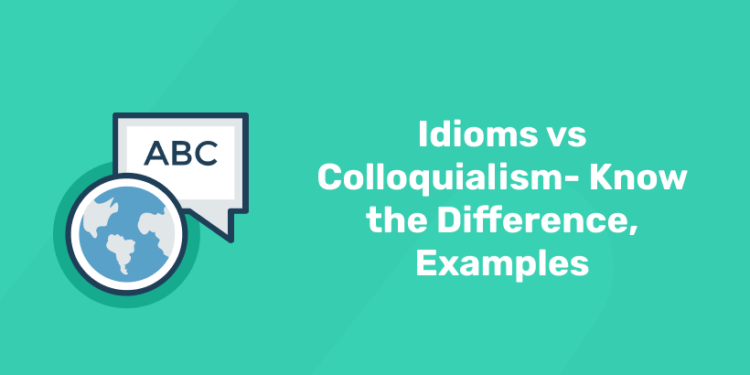Table of Contents
What is an idiom? Are you familiar with the term idiom? If you know the definition, can you define colloquialism?
Seems like you’re confused.
Idioms and colloquialisms always confuse people. What is the real difference between idiom and colloquialism? While learning a language, it is important to note that the idiom and colloquialisms are inevitable part of it. Especially in spoken language.
As language is part of the culture, idioms and colloquialisms vary according to the cultural setting of a community. The same idea can be conveyed in different ways according to the language variations. The idioms are different from one language to another.
The same goes for colloquialism too. Idioms and colloquialisms are part of the language nuances. You should be thorough about the difference between idiom and colloquialism. Continue reading the article to know more about idioms and colloquialisms in English.
Learn Spoken English with Expert mentors! Enroll Here!
Colloquialism
Colloquialism truly depends upon the region and culture of a particular geographical location. For instance, the same sport is having two different terms. Some people tend to use soccer while others use football. It is truly a matter of colloquialism. It is part of the day language of individuals belonging to a certain region. Some people use a flat while others use an apartment.
Learn Spoken English with expert mentors! Enroll Here!
These are typical examples of colloquialism. The major attraction of colloquialism is that it can be used in a casual tone. It is conversational. The word colloquialism has derived from the Latin word colloquium which indicates speaking together. It can also denote the conversation. It is used in the informal mode of conversation.
Colloquialism on the other hand is used in specific geographical locations and familiar contexts. The colloquialism is most suitable for everyday conversation. The meaning is quite sure and it is meaningful in the same sense. The words like ‘gonna’, ‘gotta go’, ‘ain’t’ etc can be considered examples of colloquialism. Colloquialism comes into play when you use it in familiar contexts. It can convey the message in a well-suited way.
Idioms
1: Which of the sentences below is grammatically correct?
Idioms are a group of words having meanings but not understandable from single individual words. Idioms make complete sense. It is a phrase. The meaning of the idioms applies to certain groups. Based on the geographical specifications, the idioms can be easily understood. When you read the words out of the context, if they can make the same sense, we could consider their idioms.
Idioms can be considered as the specific characteristics of language. As far as a noun native speaker is considered, idioms should be used in everyday conversation to heighten language proficiency. A particular group, region, language or period may truly depend on idioms. Idiom is a very broad and powerful term when compared to colloquialism. You shouldn’t take idiom in the literal sense. Neither you consider the word-by-word meaning of the idiom. It can be problematic. Place idioms in a context and find the meaning easily.
Spoken English Course for Guaranteed Confidence and Career Growth
Spoken English Course by Entri App: Enhance your communication skills, gain certification, and boost your career with confidence.
Join Now!Major Difference Between Idioms and Colloquialism
The major difference between idioms and colloquialisms should be learnt properly to avoid confusion.
Both of the terms are part of informal writing. They are very similar in tone. Most of the idioms are by nature colloquial. Colloquial is the use of phrases in informal writing. The idioms can have proper meaning among the specific community or group of individuals. Short forms and slang are also part of the informal colloquial language. The idioms won’t make literal sense. It is used to convey meaning informally.
An idiom has more meaning than individual words. For instance, pulling one’s leg, eye to eye etc are idioms which assume meaning in a particular context. Idiom can also be used as a synonym for dialect. Using idioms in daily conversation is a common way of expression.
The terms idiom and colloquialism overlap every time but need to understand the distinguishing features of both. They shouldn’t be considered identical. Idioms can be widely found in both spoken and written language. Whereas you could spot colloquialisms only in the informal spoken language. You can use idioms in the written pieces without any hesitation.
The meaning of the idioms cannot be deducted from the individual words. Formal speech is devoid of colloquialisms.
It is conversational. It has the crude property of conversation. It always resides with common speech. You can use colloquial usage to distinguish formal from informal language.
Features of Colloquialism and Idioms
Verbal speech is more associated with colloquialism. The extremely informal way of expression is what you can term colloquialism. Colloquialism is casual which is part of simple speech utilized by a characteristic geographical area. Colloquialism is the result of the invention of speakers hailing from certain regions.
Colloquialism also plays a vital role in writing as it can enhance the authenticity of dialogue exchanges between characters in a work. The colloquialism is based on geographical boundaries. It is also related to slang and jargon but in a different context. Jargon is limited to particular occupations and industries. Slang on the other hand is restricted to certain areas.
It is important to learn the key aspects of a language. You can do it with the help of a suitable guide. Learning English is not a difficult task. It should be part of your understanding. The language barriers including the mother tongue influence may hinder you from getting a deeper understanding of the English language A native English speaker or trainer can aid you in all the aspects related to language.
Learning a language is part of a long journey. But learning through proper channels is the quintessential task. Entri App is providing an opportunity for non- native speakers to explore the various aspects of language. The duration of the course is six months. The course is designed based on a comprehensive syllabus.
The syllabus covers all the aspects of the language including grammar, intonation, spelling, pronunciation, diction etc. The language lab can help the learners to practice every day. The learners will be provided with a platform to improve their communication skills.
A personal mentor will be provided for the candidates. Video classes, audio lessons, recorded classes and live sessions can improve the performance potential of the learners. Communication practice can improve the quality of education. Find the best mentors here at Entri.










